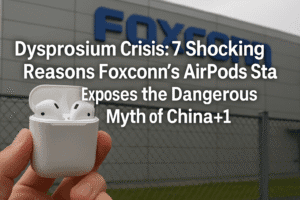Dysprosium Crisis: 7 Shocking Reasons Foxconn’s AirPods Stall Exposes the Dangerous Myth of China+1
Foxconn’s AirPods plant in Telangana, a key part of Apple’s “China+1” strategy, has hit a major hurdle—not due to labor or infrastructure, but a shortage of dysprosium, a rare earth element critical for neodymium magnets used in AirPods. China, which controls over 70% of global REE production, recently tightened export controls, stalling shipments and exposing a deeper flaw in global tech’s diversification efforts. Despite Foxconn securing End User Certificates and escalating the issue to Indian authorities, export approval from China remains delayed, disrupting production.
This crisis reveals that relocating assembly isn’t enough—raw material dependencies, especially on China, remain a weak link. India’s lack of REE processing capacity underscores the need for strategic investments in critical minerals. The broader electronics industry is also feeling the heat, with rising delays and costs. To truly de-risk supply chains, nations must look beyond manufacturing and build sovereignty over foundational raw materials. Foxconn’s stall is a warning: the real challenge in escaping China’s grip lies far below the surface.

Dysprosium Crisis: 7 Shocking Reasons Foxconn’s AirPods Stall Exposes the Dangerous Myth of China+1
While India absorbed the news of Vice President Jagdeep Dhankhar’s resignation, a quieter but potentially more impactful development unfolded in the corridors of global tech manufacturing. Foxconn’s AirPods plant in Telangana, a cornerstone of Apple’s ambitious “China+1” diversification plan, has hit an unexpected roadblock: a shortage not of skilled labour or infrastructure, but of a tiny, obscure element called dysprosium.
The Core Issue: A Mineral Bottleneck
The problem is deceptively simple yet geopolitically charged. AirPods, like much of today’s miniaturized electronics, rely on powerful neodymium magnets. To maintain performance, especially under varying temperatures, these magnets require a coating of dysprosium – a heavy rare earth element (REE). China, dominating over 70% of global REE mining and processing (including virtually all dysprosium), recently placed dysprosium and several other critical REEs under strict export controls. This move, widely seen as retaliation against US tariff threats and part of broader tech competition, has choked the supply chain.
Foxconn’s Hyderabad facility, which proudly commenced AirPods assembly in April 2024, now finds itself caught in this geopolitical crossfire. Despite official statements downplaying “disruption,” sources confirm production has been hampered. Foxconn has alerted Telangana officials, who escalated the issue to India’s Department for Promotion of Industry and Internal Trade (DPIIT).
The Bureaucratic Maze and Stopgap Measures
The resolution path highlights the complexity:
- End User Certificates (EUC): Foxconn secured EUCs – documents verifying the legitimate use of imported materials – from India’s MEA and the Chinese Embassy.
- Supplier Stalemate: Foxconn’s Chinese dysprosium supplier submitted these EUCs to Beijing for final export approval. This approval remains pending, well beyond the typical 45-50 day window.
- Scrambling for Solutions: Foxconn is reportedly rationing existing dysprosium stocks and managing the “product cycle” to stretch supplies, hoping for approval by month-end. Meanwhile, industry sources note a “slowdown” that’s only recently eased slightly.
Beyond AirPods: A Systemic Vulnerability Exposed
This isn’t just about earbuds. It exposes a critical flaw in the “de-risking from China” narrative:
- The Raw Material Reality: Diversifying final assembly is one thing; diversifying the entire supply chain, especially for deeply embedded, China-dominated raw materials like REEs, is exponentially harder and slower. Foxconn moved production out of China, but the materials remain inextricably linked.
- Strategic Leverage: China’s control over dysprosium (crucial for military tech like laser targeting too) gives it potent leverage. Export controls become a powerful non-tariff barrier, potentially undermining competitors’ manufacturing elsewhere.
- India’s Challenge: While attracting assembly plants, India (and other nations) lacks significant REE mining and processing capabilities. Developing this is capital-intensive and environmentally challenging, requiring long-term investment and policy support.
- Broader Industry Pain: Foxconn/Apple aren’t alone. The India Cellular and Electronics Association (ICEA) has formally warned the government that Chinese REE export curbs are causing delays and cost inflation across the sector.
The Road Ahead: More Than Just Paperwork
Resolving Foxconn’s immediate dysprosium crunch hinges on opaque Chinese bureaucratic approval. However, the larger lessons are clear:
- Diversification Must Go Deeper: Truly resilient supply chains demand investment not just in final assembly, but in securing and processing critical raw materials. This requires global cooperation and significant R&D into alternatives or recycling.
- Geopolitics is Inescapable: Tech manufacturing is now firmly entangled with national security and strategic competition. Companies must navigate this complex landscape with far greater awareness.
- India’s Opportunity (and Hurdle): To become a genuine alternative manufacturing hub, India needs a coherent national strategy for critical minerals – encompassing exploration, processing, international partnerships, and streamlined import protocols.
Foxconn’s Telangana hiccup is a microcosm of a macro challenge. The tiny magnets in our AirPods are a stark reminder that the global tech ecosystem’s shift away from China has a long, complex, and mineral-dependent journey ahead. Building truly independent supply chains requires moving far beyond assembly lines and tackling the foundational layers of raw material sovereignty. The path to diversification is paved not just with factories, but with rare earths.
You must be logged in to post a comment.